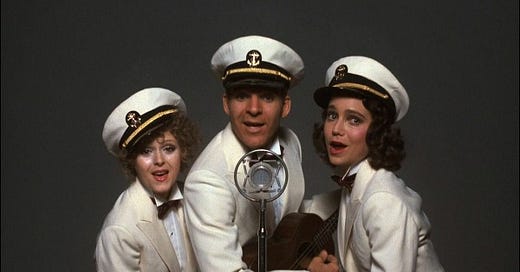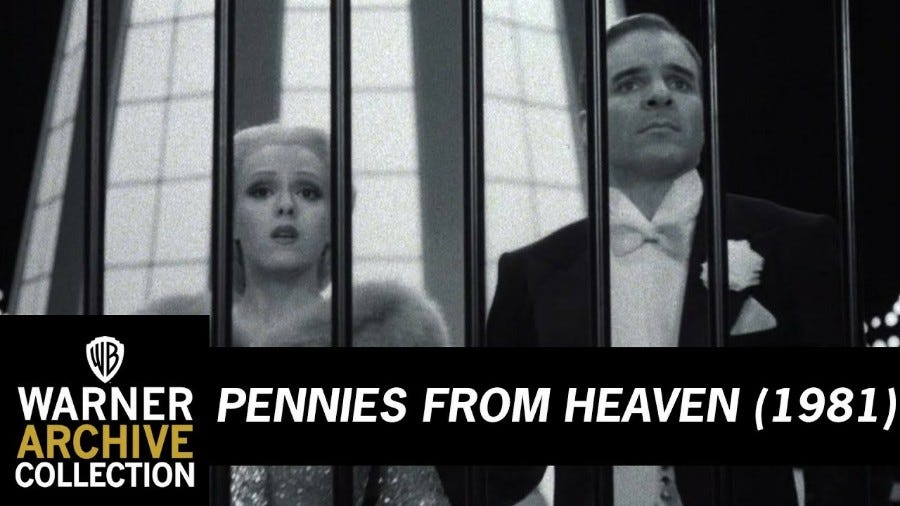Stream On: unpopular take—I love ‘Pennies from Heaven’
What to stream on TV: Steve Martin’s second movie was a musical tragedy about a sheet-music salesman—and a flop at the box office. It’s a great movie.
Dennis Potter (1935–1994), one of the most influential and innovative dramatists in British television, produced a six-episode musical drama for the BBC called Pennies from Heaven in 1978. (As of this writing, it’s available on YouTube.) It’s a remarkable concept; like most of Potter’s works it mixes comedy and drama, dark fantasy and reality, somewhat like the magic realism we’ve seen in Midnight in Paris and Northern Exposure. American director Herbert Ross asked Potter to work up a cinema treatment, which was released in 1978, starring Steve Martin, Bernadette Peters and Jessica Harper. It was a box-office bomb, losing 13 million dollars.
/Amazon /Streaming /Trailer /🍅82%🍿64% /1981 /R
“I’m Arthur—and I love you!” (Arthur Parker)
Before the widespread adoption of electricity, if you wanted to hear a piece of music, you’d better know how to play a musical instrument. Pianos and guitars were popular in households, and music collectors collected sheet music. But by the time of the Great Depression, radios and phonographs made sheet music all but obsolete. The hero of Pennies from Heaven, Arthur Parker (Steve Martin), was a sheet-music salesman during the Depression.
And his story is depressing. Bleak. Pathetic. Arthur is having trouble selling his wares to retailers, and at home, his wife Joan (Jessica Harper) is—old fashioned, a proper lady, who loves Arthur, but is scandalized by his marriage-chamber desires.
Arthur is a victim of popular culture; the songs he peddles are, since the ’twenties, pretty racy, and Arthur’s fantasy life becomes so rich that it takes over his reality at times. As the movie opens, Arthur wakes up; he rolls over to his sleeping wife, who rebuts him; and he gets up. He stands behind Joan as she brushes her teeth, a look of pathetic longing in his eyes, and we go from Arthur in the mirror behind Joan to a single shot of him standing in his pajamas. He opens his mouth, and we hear Connie Boswell singing “I’ll Never Have to Dream Again,” from her 1932 record.
Martin lip-synchs the record perfectly, seriously. During, we see another shot of him in the mirror behind Joan, longing, not “singing,” then back to his one-shot; behind him we no longer see the bathroom, but a bright blue vista. As the song fades out, he’s coming downstairs. Joan offers him breakfast on his way out but he declines, saying he’d rather feel empty.
The dramatic sequences of Pennies from Heaven, between the fanciful, brightly lit and increasingly extravagantly choreographed musical sequences, feel trancelike and depressing—at times the actors seem to be reciting the lines, but their expressions really convey emotion. The transitions between the bleak drama and the cheerful song and dance numbers are abrupt, a little more so than in Potter’s original TV miniseries (which had a much smaller budget), and this seemed to confuse and turn off audiences.
What I thought, when I first drank all this in, is that here is a heck of a movie! A movie. I’m sensitive to what I call pure cinema, that is, a story that can’t be told any other way. This story, to me, couldn’t, and it owned up to being a movie, so when reality flew out the window, in a very entertaining way, I was there for it!
American playwright, theater director, dancer and entertainer Vernel Bagneris, in his third credited screen role, was the heart of the film as “the accordion man,” a stuttering, down-on-his-luck hitch-hiking busker that Arthur picks up in his car on the way to yet another dingy town. Arthur, who is ultimately a jerk, takes him to a diner and gives him lunch, all the time passive-aggressively humiliating him, like a man who is beaten down at work and goes home to kick his kid. The busker is only too grateful for the meal. He stares at Arthur, opens his mouth—and out comes Arthur Tracy’s 1937 recording of “Pennies from Heaven,” which is a much darker take than Bing Crosby’s original: Tracy is almost moaning the words. Arthur, who had been supercilious to the accordion man, is stunned.
The side to the diner slides away revealing a soundstage in the rain; as the accordion man steps out, still lip-synching Arthur Tracy’s vocals, the rain turns to pennies; the backdrop is a montage of sepia photos of the Depression, and the accordion man dances, an amazing loose-limbed shuffle, like Magnolia’s in Showboat, but without joy. When the music ends and the busker comes back to the table, it’s as if nothing has happened: Arthur is rude again.
The plot of the movie involves Arthur’s romance with an innocent schoolteacher who is “ruined” and becomes a lady of the evening—her pimp is played by Christopher Walken (The Anderson Tapes, Who Am I This Time?), who does a terrific strip-tease and tap-dance in a bar, while lip-synching “Let’s Misbehave” from Irving Aaronson & his Commanders, 1926. There’s also a murder, a trial, a hanging—and singing and dancing! If you expect realism from movies, give Pennies from Heaven a miss—but if you like movies, check it out. Audiences have come a ways from 1981.
Pete Hummers is a participant in the Amazon Services LLC Associates Program, an affiliate advertising program designed to earn fees by linking Amazon.com and affiliate sites. This adds nothing to Amazon's prices. This column originally appeared on The Outer Banks Voice.




